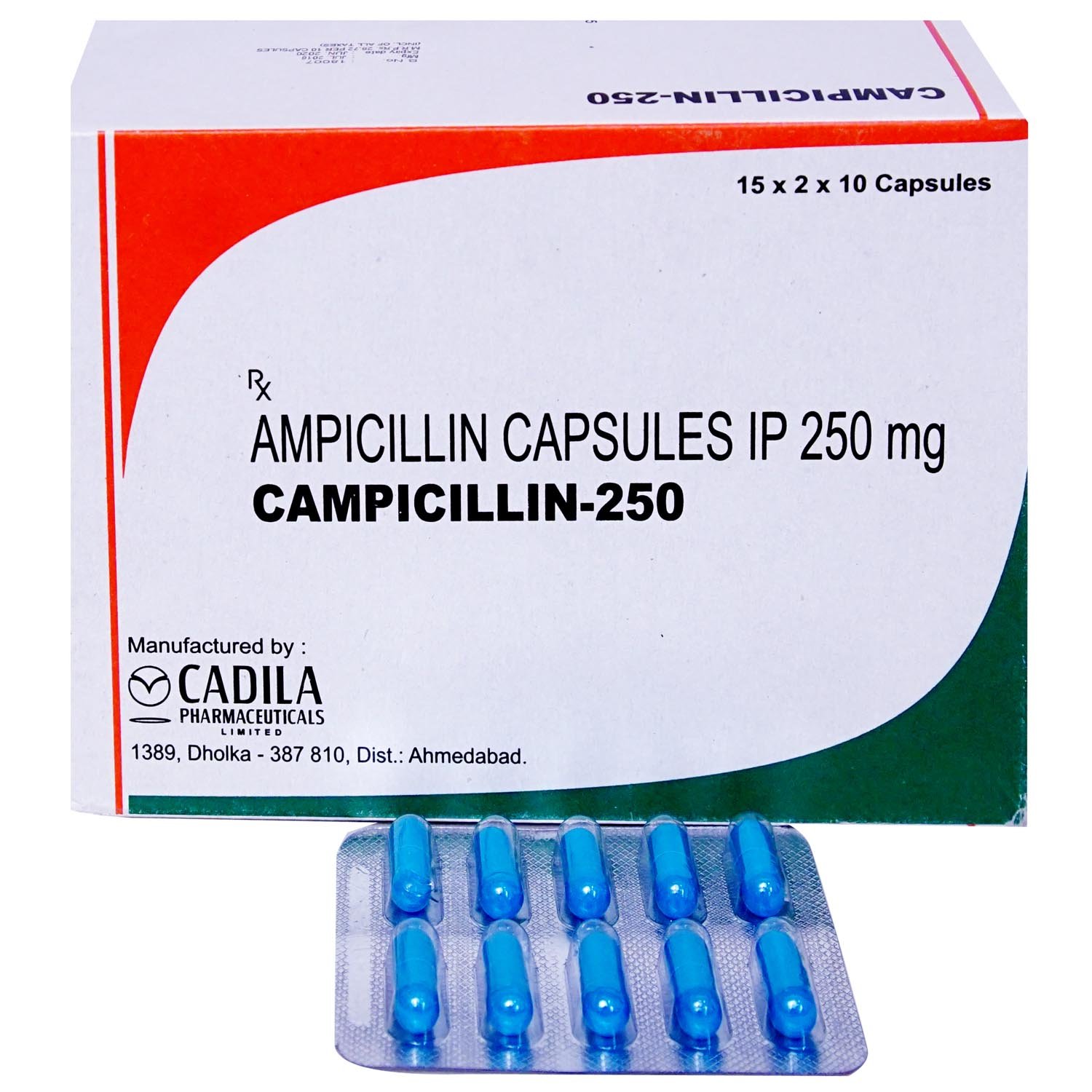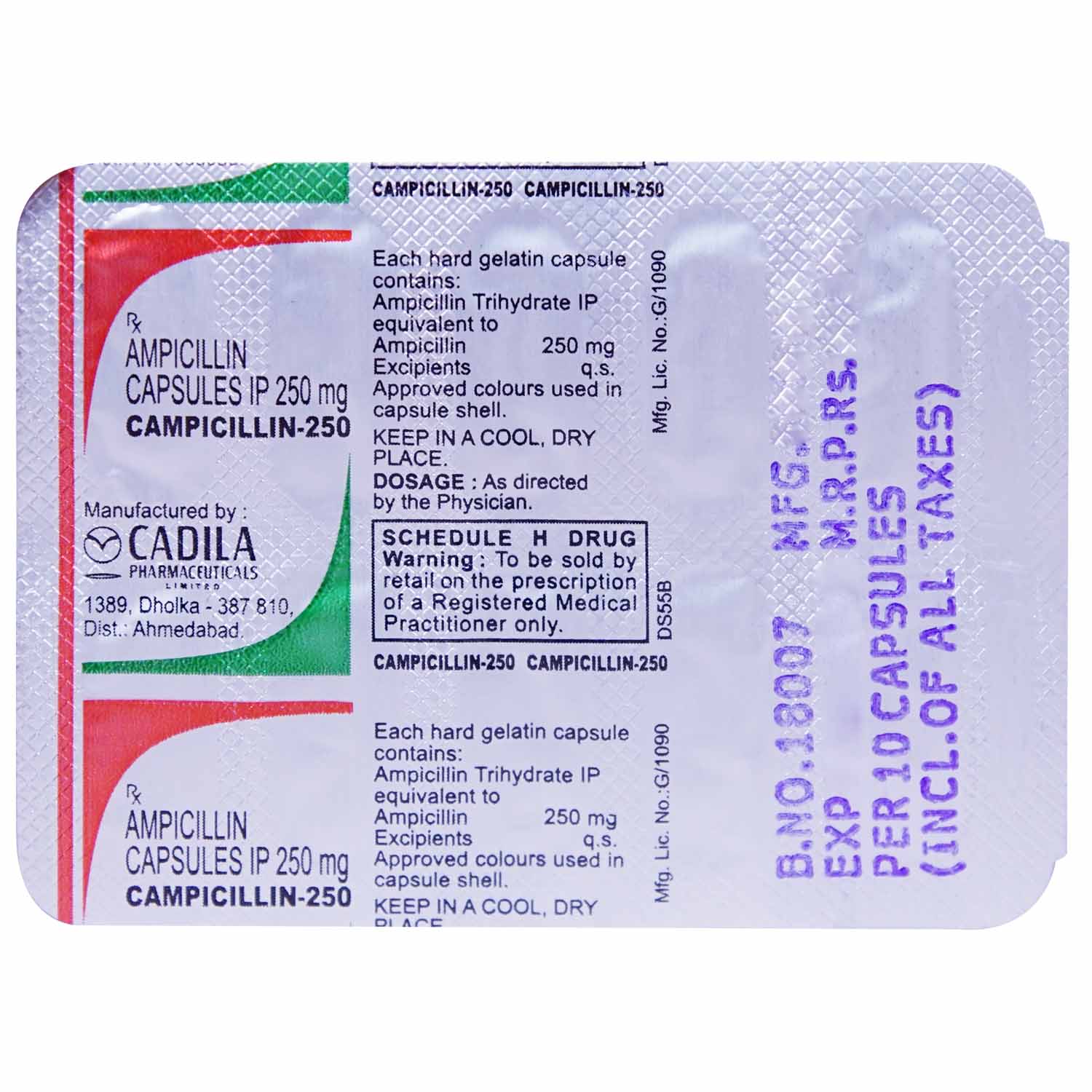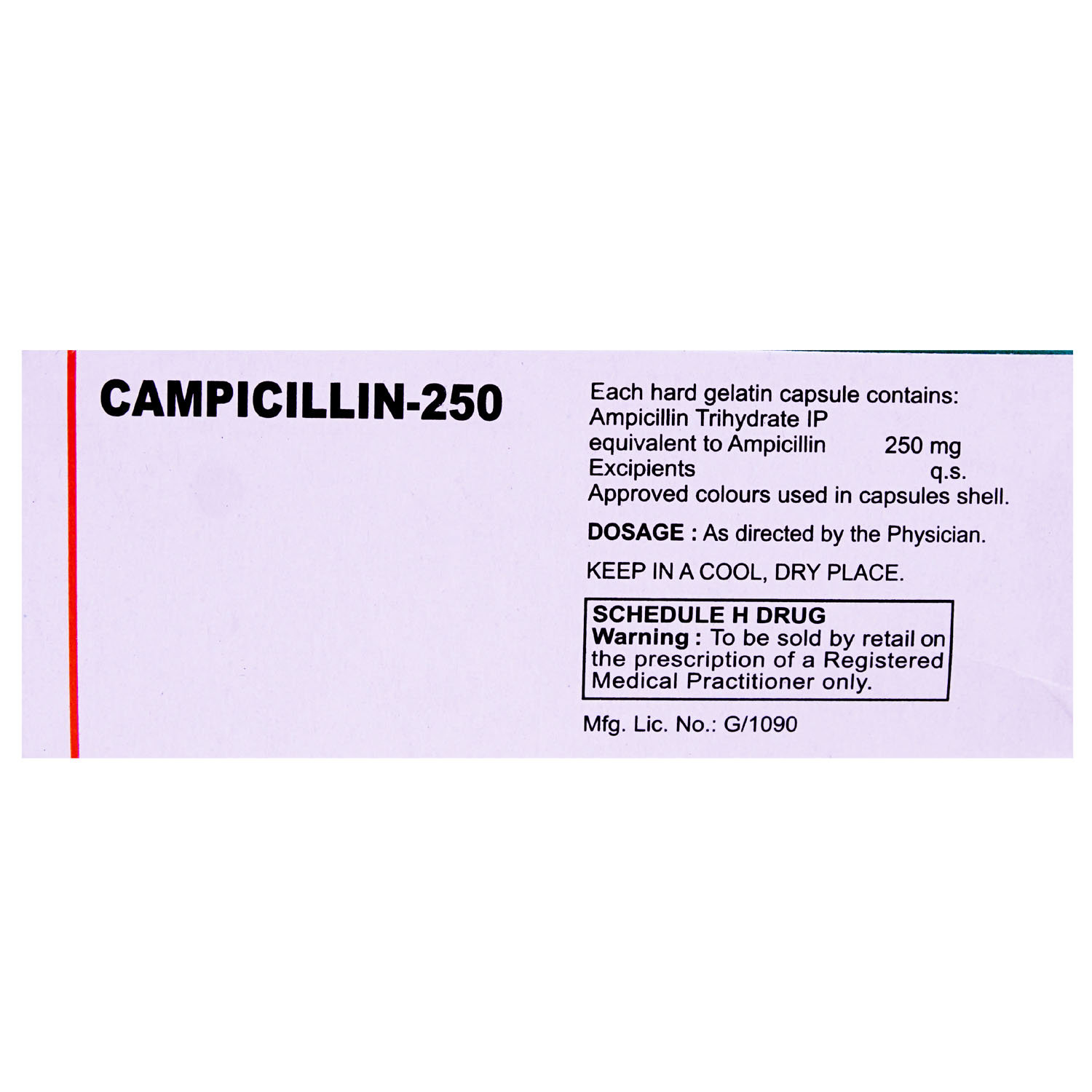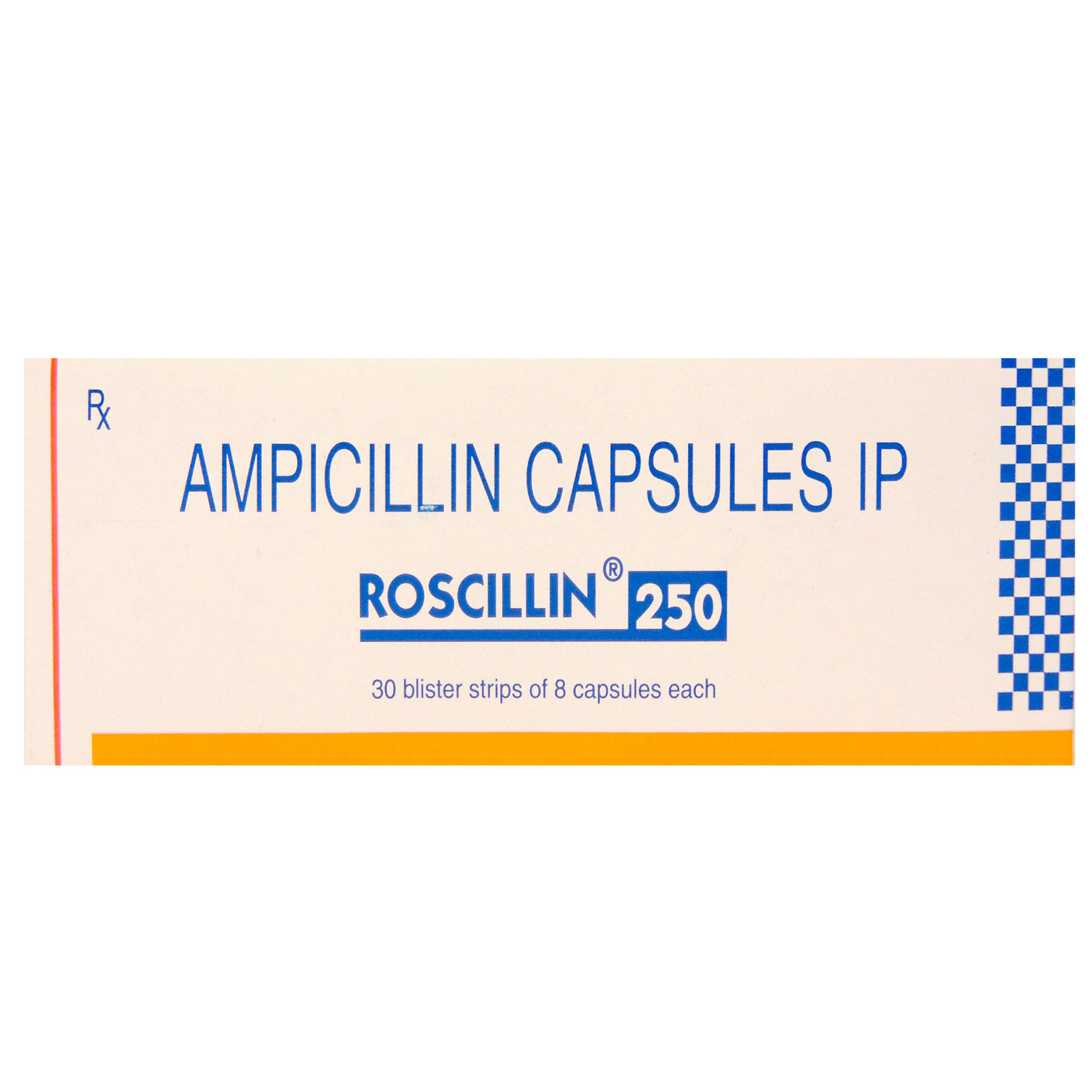Campicilin 250 Capsule 10's
MRP ₹42.5
(Inclusive of all Taxes)
₹6.4 Cashback (15%)
Provide Delivery Location
Online payment accepted
 Prescription drug
Prescription drugWhats That
Composition :
Manufacturer/Marketer :
Consume Type :
Expires on or after :
Return Policy :
About Campicilin 250 mg Capsule
Campicilin 250 mg Capsule belongs to a class of medicines called penicillin antibiotics. Campicilin 250 mg Capsule is commonly used to treat various bacterial infections of the lungs, skin, stomach, and kidneys as well as sexually transmitted infections like gonorrhoea. A bacterial infection occurs when harmful bacteria enter the body, multiply and cause infection. It can infect any part of the body and multiple very quickly.
Campicilin 250 mg Capsule contains Ampicillin that works against various types of bacteria. It inhibits the process of bacterial cell wall synthesis that is required for its survival. Thus, Campicilin 250 mg Capsule kills bacteria and prevents the growth of bacterial infection.
Campicilin 250 mg Capsule should be taken 30 minutes before food or 2 hours after food, on an empty stomach. Campicilin 250 mg Capsule may cause certain common side effects such as injection site reactions, rash, vomiting, allergic reaction, vaginal itching, or discharge, nausea, and diarrhea. Most of these side effects are mild and subside over time. However, if these persist contact your doctor immediately.
Campicilin 250 mg Capsule should be avoided if you are allergic to it, or other penicillin antibiotics. Also, inform your doctor if you have any kidney or liver problems. Pregnant and nursing mothers should consult a doctor before Campicilin 250 mg Capsule treatment. Birth control pills may not work effectively while using this medication. So, speak to your doctor about using non-hormonal birth control to avoid pregnancy.
Uses of Campicilin 250 mg Capsule
Directions for Use
Key Benefits
Campicilin 250 mg Capsule is a broad-spectrum penicillin antibiotic that is effective against a wide range of bacterial infections. Infectious or harmful bacteria can make you sick and reproduce quickly in your body. Campicilin 250 mg Capsule mainly kills the bacteria and prevents the growth of bacterial infection. It is used in the treatment of bacterial infections such as meningitis, kidney infections, gonorrhoea, pneumonia, or infections of the intestines or stomach. Campicilin 250 mg Capsule is also used in combination with other penicillin antibiotics called flucloxacillin and the combination is known as co-fluampicil.
Storage
- Report the itching to your doctor immediately; they may need to change your medication or dosage.
- Use a cool, damp cloth on the itchy area to help soothe and calm the skin, reducing itching and inflammation.
- Keep your skin hydrated and healthy with gentle, fragrance-free moisturizers.
- Try not to scratch, as this can worsen the itching and irritate your skin.
- If your doctor prescribes, you can take oral medications or apply topical creams or ointments to help relieve itching.
- Track your itching symptoms and follow your doctor's guidance to adjust your treatment plan if needed. If the itching persists, consult your doctor for further advice.
- Drink water or other clear fluids.
- To prevent worsening of pain, limit intake of tea, coffee, or alcohol.
- Include bland foods like rice, toast, crackers, and rice in your diet.
- Avoid lying down immediately after eating as it may cause indigestion or heartburn.
- Avoid acidic and spicy food as it may cause indigestion.
- Tell your doctor about your GAS symptoms. They may change your medication regimen or prescribe additional drugs to help you manage them.
- To manage GAS symptoms, eat a balanced diet of fibre, vegetables, and fruits.
- Drink enough water throughout the day to avoid constipation and treat GAS symptoms.
- Regular exercise like yoga and walking may help stimulate digestion and alleviate GAS symptoms.
- Take probiotics only if your doctor advises, as they may help alleviate GAS symptoms by promoting gut health.
- Take medication for GAS symptoms only if your doctor advises, as certain medications can interact with your existing prescriptions or worsen symptoms.
- If symptoms persist, worsen, or are accompanied by severe abdominal pain, vomiting, or bleeding, seek immediate medical attention.
Drug Warnings
Inform your doctor immediately if you have any hypersensitive reactions, severe stomach pain, pale skin, short of breath after taking Campicilin 250 mg Capsule . Also, Let your doctor know if you ever had diabetes, asthma, kidney disease, or antibiotics-induced diarrhea. This medicine may lower the efficiency of oral birth control pills or contraceptive devices. Campicilin 250 mg Capsule may alter test results with certain medical tests. Tell your doctor before undergoing those tests that you are using Campicilin 250 mg Capsule .
Drug-Drug Interactions
Drug-Drug Interactions
Login/Sign Up
When BCG vaccine is used with Campicilin 250 Capsule, its effectiveness may be reduced.
How to manage the interaction:
Taking Campicilin 250 Capsule with BCG vaccine can lead to an interaction, please consult a doctor before taking it. Do not discontinue the medication without consulting a doctor.
Co-administration of Campicilin 250 Capsule with Cholera, live attenuated together may reduce the activity of the vaccine.
How to manage the interaction:
If you are currently being treated with Campicilin 250 Capsule or have been treated within the last 14 days, talk to your doctor before receiving cholera vaccine, live. Do not discontinue the medication without consulting a doctor.
Co-administration of Methotrexate with Campicilin 250 Capsule can increase the levels and side effects of Methotrexate.
How to manage the interaction:
Although there is a possible interaction between methotrexate and Campicilin 250 Capsule, you can take these medicines together if prescribed by your doctor. However, if you experience any symptoms such as tiredness, dizziness, fainting, unusual bleeding or bruising, chills, fever, sore throat, body pains. Consult a doctor immediately. Do not stop using medications without a doctor's advice.
Drug-Food Interactions
Drug-Food Interactions
Login/Sign Up
Diet & Lifestyle Advise
- Diarrhea may happen as a side effect. Taking probiotics after completing treatment with Campicilin 250 mg Capsule may help. Talk to your doctor if you notice blood stools or develop stomach cramps.
- Drink plenty of fluids to avoid an upset stomach and hydrate your body.
- Avoid intake of alcoholic beverages with Campicilin 250 mg Capsule as it can make you dehydrated and may affect your sleep. This can make it harder for your body to aid the Campicilin 250 mg Capsule in fighting off infections.
- Maintain good hygiene and avoid contaminated or processed food.
- Include more fibre enriched food like whole-grain bread, and brown rice in your diet, as it can be easily digested by your gut bacteria which helps stimulate their growth.
- Avoid taking too much calcium enriched foods and drinks as it might affect the working of Campicilin 250 mg Capsule .
Side Effects of Campicilin 250 mg Capsule
- Nausea
- Vomiting
- Stomach pain
- Diarrhoea
- Vaginal itching or discharge
Habit Forming
Therapeutic Class
All Substitutes & Brand Comparisons
RX
Out of StockIntacillin 250mg Capsule
Intas Pharmaceuticals Ltd
₹18.71
(₹1.68 per unit)
56% CHEAPERRX
Out of StockT Cillin 250mg Capsule
₹26.5
(₹2.39 per unit)
37% CHEAPERRX
Out of StockSyscillin 250mg Capsule
₹29.9
(₹2.69 per unit)
29% CHEAPER
Drug-Diseases Interactions
Drug-Diseases Interactions
Login/Sign Up
Nearly all antibacterial medications have been associated with Clostridioides difficile-associated diarrhoea (CDAD), formerly known as pseudomembranous colitis, which can range in severity from mild diarrhoea to deadly colitis. Lincomycin and clindamycin are typically to blame.
How to manage the interaction:
Campicilin 250 Capsule should be used with caution in patients with a history of gastrointestinal disease, particularly colitis (inflammation in the large intestine) and pseudomembranous colitis (generally characterized by severe, persistent diarrhoea and severe abdominal cramps and sometimes associated with the passage of blood and mucus).
When given an aminopenicillin antibiotic for mononucleosis, patients may experience a pruritic, erythematous, maculopapular skin rash. Usually, the rash self-limits and goes away a few days after the offending chemical is stopped. The underlying mechanism has been suggested to be a changed drug metabolism or an immune-mediated process unrelated to drug hypersensitivity. Patients with mononucleosis shouldn't receive treatment with antibiotics containing aminopenicillin.
How to manage the interaction:
Campicilin 250 Capsule should not be used in patients with mononucleosis (contagious infection caused by virus) as it may cause skin rash.
The kidneys remove the majority of beta-lactam antibiotics as unaltered drugs and, in some situations, as metabolites as well. In individuals with reduced renal function, the serum concentrations of beta-lactam antibiotics and their metabolites may rise, and their half-lives may be prolonged. These individuals have had parenteral administration of these drugs and have experienced neurotoxic responses such as encephalopathy, asterixis, myoclonus, seizures, and coma. Adjustments to the dosage may be required.
How to manage the interaction:
Dose adjustments may be required in patients with kidney impairment. Kidney function tests should be performed at regular intervals during prolonged and/or high-dose therapy since nephrotoxicity (rapid deterioration in kidney function) and alterations in kidney function have occasionally been associated with the use of Campicilin 250 Capsule.
FAQs
Do not use anti-diarrhoeal medication until the doctor has prescribed you. You can drink plenty of fluids (electrolytes) to avoid dehydration. Besides this, you can also take prebiotics or probiotics to manage diarrhea as it may help in increasing the number of good bacteria in the intestine which aids in digestion.
Campicilin 250 mg Capsule contains ampicillin, an antibiotic that works by interfering with the formation of the bacterial cell wall (a protective covering) that is necessary for their survival. Thereby damages the bacterial cell wall and kills bacteria.
Yes, Campicilin 250 mg Capsule may be used to treat lung infections caused by bacteria. Campicilin 250 mg Capsule is an antibiotic that kills bacteria and prevents the spread of infection.
No, this is an antibiotic medication. You need to complete the full course even if you start to feel better to prevent the return of infection and resistance to Campicilin 250 mg Capsule .
Campicilin 250 mg Capsule does not work against viral infection. So, it should not be taken to treat the common cold or cough. Consult your doctor if you have these symptoms.
Use of Campicilin 250 mg Capsule may lower the efficiency of birth control pills. Ask your doctor about using other contraception devices like diaphragm, condom, spermicide, copper T, etc with Campicilin 250 mg Capsule .
Campicilin 250 mg Capsule may cause diarrhoea as a common side effect. However, if the condition persists, worsens or if you notice blood or mucus in stools, avoid taking Campicilin 250 mg Capsule and consult a doctor immediately
Drug-Drug Interactions Checker List
- TYPHOID VACCINE
- CEFADROXIL
- CEFACLOR
- CEFAZOLIN
- CEFIXIME
- CEFPODOXIME
- CEFPROZIL
- CEPHALEXIN
- ALLOPURINOL
- PROBENECID
Special Advise
- Even if you feel better after treatment with Campicilin 250 mg Capsule , do not stop taking it. This might cause the symptoms to reappear and will make the infection difficult to treat due to antibiotic resistance.
- Make sure you drink plenty of fluids when you are sick. This will in general help you clear out the infection faster, protect you from dehydration, and will help you overcome some unpleasant side effects of taking Campicilin 250 mg Capsule .
- Stop taking Campicilin 250 mg Capsule and consult your doctor immediately if you develop any allergic reactions such as itching, skin rash, swelling of the face, throat, tongue, and, breathing difficulties.
Disease/Condition Glossary
Bacterial infections: A bacterial infection is a condition in which harmful bacteria enter, multiply, and infect the body. It can target any part of the body and multiply very quickly. When you get infected with bacteria, you can experience generalized symptoms, like fevers, chills, and fatigue. Anyone can get a bacterial infection, but people with a weak immune system or taking immunosuppressive medicines like steroids are more prone to infections. Campicilin 250 mg Capsule does not work against infections caused by viruses, including cold and flu.

Have a query?
Alcohol
Safe if prescribed
Avoid consumption of alcohol while taking treatment with Campicilin 250 mg Capsule .
Pregnancy
Consult your doctor
Campicilin 250 mg Capsule should not be used when pregnancy unless clearly necessary. So, inform your doctor if you are pregnant or planning a pregnancy.
Breast Feeding
Consult your doctor
Consult your doctor before taking Campicilin 250 mg Capsule ; your doctor will decide whether Campicilin 250 mg Capsule can be taken by breastfeeding mothers or not.
Driving
Safe if prescribed
It is safe to drive a motor vehicle after using Campicilin 250 mg Capsule .
Liver
Consult your doctor
Campicilin 250 mg Capsule can be safely used in case of liver disease if prescribed by your doctor.
Kidney
Consult your doctor
Campicilin 250 mg Capsule should be used under caution in patients with kidney disease. Inform your doctor if you have kidney problems. Your doctor will prescribe only if the benefits outweigh the risks. If prescribed, the dose may be adjusted by your doctor based on your health condition.
Children
Safe if prescribed
Campicilin 250 mg Capsule can be given safely to children, dose to be adjusted and recommended by a child specialist only.











